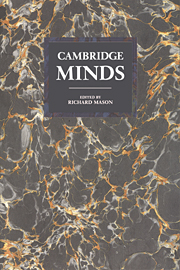Book contents
- Frontmatter
- Contents
- Notes on contributors
- Preface
- 1 The effects of a broken home: Bertrand Russell and Cambridge
- 2 I. A. Richards, F. R. Leavis and Cambridge English
- 3 Emily Davies, the Sidgwicks and the education of women in Cambridge
- 4 Radioastronomy in Cambridge
- 5 Three Cambridge prehistorians
- 6 John Maynard Keynes
- 7 Mathematics in Cambridge and beyond
- 8 James Stuart: engineering, philanthropy and radical politics
- 9 The Darwins in Cambridge
- 10 How the Burgess Shale came to Cambridge; and what happened
- 11 Ludwig Wittgenstein
- 12 ‘Brains in their fingertips’: physics at the Cavendish Laboratory 1880–1940
- 13 J. N. Figgis and the history of political thought in Cambridge
- 14 Molecular biology in Cambridge
- 15 James Frazer and Cambridge anthropology
- 16 Michael Oakeshott
10 - How the Burgess Shale came to Cambridge; and what happened
Published online by Cambridge University Press: 21 October 2009
- Frontmatter
- Contents
- Notes on contributors
- Preface
- 1 The effects of a broken home: Bertrand Russell and Cambridge
- 2 I. A. Richards, F. R. Leavis and Cambridge English
- 3 Emily Davies, the Sidgwicks and the education of women in Cambridge
- 4 Radioastronomy in Cambridge
- 5 Three Cambridge prehistorians
- 6 John Maynard Keynes
- 7 Mathematics in Cambridge and beyond
- 8 James Stuart: engineering, philanthropy and radical politics
- 9 The Darwins in Cambridge
- 10 How the Burgess Shale came to Cambridge; and what happened
- 11 Ludwig Wittgenstein
- 12 ‘Brains in their fingertips’: physics at the Cavendish Laboratory 1880–1940
- 13 J. N. Figgis and the history of political thought in Cambridge
- 14 Molecular biology in Cambridge
- 15 James Frazer and Cambridge anthropology
- 16 Michael Oakeshott
Summary
Does any family not have its legends? One of my family's is of the Scots ancestor (surely a Stewart) who was blown up during the construction of the Canadian Pacific Railway (CPR), catapulted on to a frozen lake – and survived. I am pretty sure the incident was in British Columbia and I like to think that this small drama was enacted somewhere close to the rail-town of Field, because if so it provides a link to my own life and a subject I have pursued for more than twenty years, the Burgess Shale.
It was inevitable that the building of the CPR led to exploration of the hitherto inaccessible hinterland, mostly of course for minerals, preferably gold. So it was that the amazing fossil beds on the north shoulder of Mount Stephen must have been discovered, at a locality only a few hours hike from Field. Henry Woodward, writing in 1902, noted that the first fossils on Mount Stephen were discovered by 1884 by L. M. Lambe, then a surveyor on the CPR, who went on to become a vertebrate palaeontologist in the Geological Survey of Canada (GSC). In a more recent account Desmond Collins narrates how a carpenter working on the tourist hotel in Field had also found trilobites. This information was given to Otto Klotz, an astronomer and surveyor taking geodetic measurements along the new railroad.
Information
- Type
- Chapter
- Information
- Cambridge Minds , pp. 126 - 141Publisher: Cambridge University PressPrint publication year: 1994
Accessibility standard: Unknown
Why this information is here
This section outlines the accessibility features of this content - including support for screen readers, full keyboard navigation and high-contrast display options. This may not be relevant for you.Accessibility Information
- 1
- Cited by
